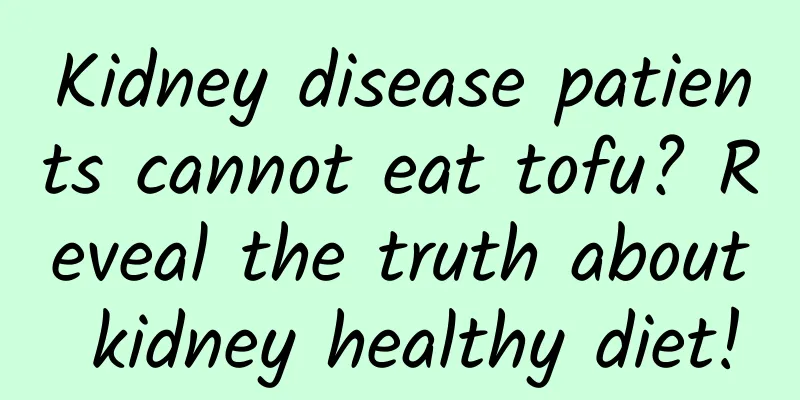Kidney disease patients cannot eat tofu? Reveal the truth about kidney healthy diet!

|
Among the many rumors about the diet of kidney patients, the saying that "kidney patients cannot eat tofu" is widely circulated. Many kidney patients therefore stay away from tofu, fearing that this delicious food will increase the burden on the kidneys. But is this really the case? Today, let us uncover the truth about kidney-healthy diet and provide scientific basis for the dietary choices of kidney patients. Tofu, as a traditional soy product, is rich in high-quality plant protein, calcium, phosphorus, iron and other nutrients. However, due to its high protein content, many people believe that eating tofu will increase the burden on kidney excretion of protein metabolic waste, thereby damaging kidney function. This view is actually somewhat one-sided. For patients with kidney disease, protein intake does need to be strictly controlled, but it does not mean that tofu cannot be eaten at all. The key is to control the amount and type of protein intake. Generally speaking, for patients with kidney disease and normal renal function, the daily protein intake can be controlled at 0.8-1.0 grams per kilogram of body weight; for patients with impaired renal function, the protein intake should be further reduced to about 0.6-0.8 grams per kilogram of body weight. In terms of protein selection, high-quality protein should be given priority, such as animal protein such as eggs, milk, lean meat, fish, and soy protein. Although soy protein is a plant protein, its amino acid composition is similar to that of animal protein, with high nutritional value, and the isoflavones it contains also have a certain kidney-protecting effect. Therefore, it is safe and feasible for patients with kidney disease to eat tofu and other soy products in moderation. In addition to protein, a kidney-healthy diet also requires attention to the intake of other nutrients. 1. Sodium intake Kidney disease patients often have symptoms of edema and hypertension, which requires strict control of sodium intake. A high-sodium diet can lead to water retention in the body, aggravate edema and hypertension, and further damage kidney function. Therefore, kidney disease patients should try to reduce the consumption of high-sodium foods such as pickles, pickled products, and processed foods, and the daily salt intake should be controlled at 3-5 grams. At the same time, we should also pay attention to the intake of some invisible sodium, such as soy sauce, chicken essence, bread and other foods, which all contain a certain amount of sodium. 2. Potassium intake The kidneys play an important role in maintaining potassium balance in the body. When kidney function is impaired, the ability to excrete potassium decreases, and hyperkalemia is prone to occur. Hyperkalemia can have a serious impact on important organs such as the heart, and can even be life-threatening. Therefore, patients with kidney disease need to adjust their potassium intake according to their own blood potassium levels. For patients with normal blood potassium, they can eat some potassium-rich foods in moderation, such as bananas, oranges, potatoes, spinach, etc.; but for patients who already have hyperkalemia, they should avoid eating these high-potassium foods. At the same time, they should also pay attention to the fact that some low-sodium salts contain higher potassium and cannot be used at will. 3. Phosphorus intake Phosphorus is mainly excreted through the kidneys. When renal function is impaired, phosphorus excretion decreases, which will lead to increased blood phosphorus. Hyperphosphatemia can cause hyperparathyroidism, leading to calcium-phosphorus metabolism disorders, further aggravating kidney and bone damage. Therefore, patients with kidney disease should limit their phosphorus intake. Foods with high phosphorus content include animal offal, nuts, dairy products, cola, etc., which should be eaten as little as possible. You can choose some low-phosphorus foods, such as egg white, winter melon, apples, etc. At the same time, the phosphorus in some foods exists in the form of organic phosphorus, and the human body has a low absorption rate for it, such as rice, flour, etc., which are relatively more suitable for patients with kidney disease. 4. Water intake Water intake is also crucial for patients with kidney disease. If the patient does not have obvious symptoms such as edema and oliguria, he or she can drink water normally and ensure that he or she consumes 1500-2000 ml of water every day to promote urine excretion and reduce the retention of metabolic waste in the body. However, for patients who have already developed edema, oliguria or severe renal damage, water intake needs to be strictly controlled, and the amount of water intake should be adjusted according to urine volume and body weight to avoid aggravating edema and heart burden. It is a common misconception that patients with kidney disease cannot eat tofu. A healthy diet for kidneys requires comprehensive consideration of the intake of multiple nutrients. On the premise of ensuring balanced nutrition, the diet structure should be reasonably adjusted according to one's own kidney function and physical indicators. Through scientific dietary management, patients with kidney disease can not only reduce the burden on the kidneys and delay the progression of the disease, but also improve the quality of life. Of course, a specific diet plan is best formulated under the guidance of a doctor or nutritionist to ensure safety and effectiveness. Let us work together to protect kidney health with a scientific diet and break those unfounded dietary rumors. |
Recommend
Pregnant women need to prepare for childbirth
Giving birth is a major event in the life of ever...
The secret behind bad breath: It’s not just a problem with your mouth, your whole body may be “having a tantrum”
Bad breath: a health sign that shouldn’t be ignor...
Brushing your teeth correctly is more important than choosing the right toothpaste
Today (September 20) is the 33rd "National L...
How to use sanitary napkins for women
In our lives, many women need to use sanitary nap...
Can I get pregnant during my period?
Pregnancy is a great joy for many people, it mean...
Eight health checklists! Following the checklist is the key to improving and maintaining cardiovascular health
Life's Essential 8™ Checklist for Lifelong He...
Comscore: Google and Apple control US users' usage habits through pre-installed apps
According to reports, the latest survey results s...
Here are 5 tips to prevent senile cataracts
Eyes are the windows to the soul, and they are an...
What is the cause of bleeding at 6 weeks of pregnancy?
For every family, a wife's pregnancy is a ver...
How long after a meal should pregnant women drink milk powder?
Pregnant women need to maintain nutrient absorpti...
Walking out of health
Walking - the best exercise in the world Did you ...
Single eyelid makeup tips, do this and you will be more beautiful
Everyone wants to have beautiful double eyelids, ...
Does uterine cold affect ovulation?
Uterine cold can indeed affect ovulation and caus...
Why do women often have vaginal itching?
I believe that every woman, especially married wo...
How to solve the problem of wife's sexual indifference
Some people find that their wives are sexually co...









